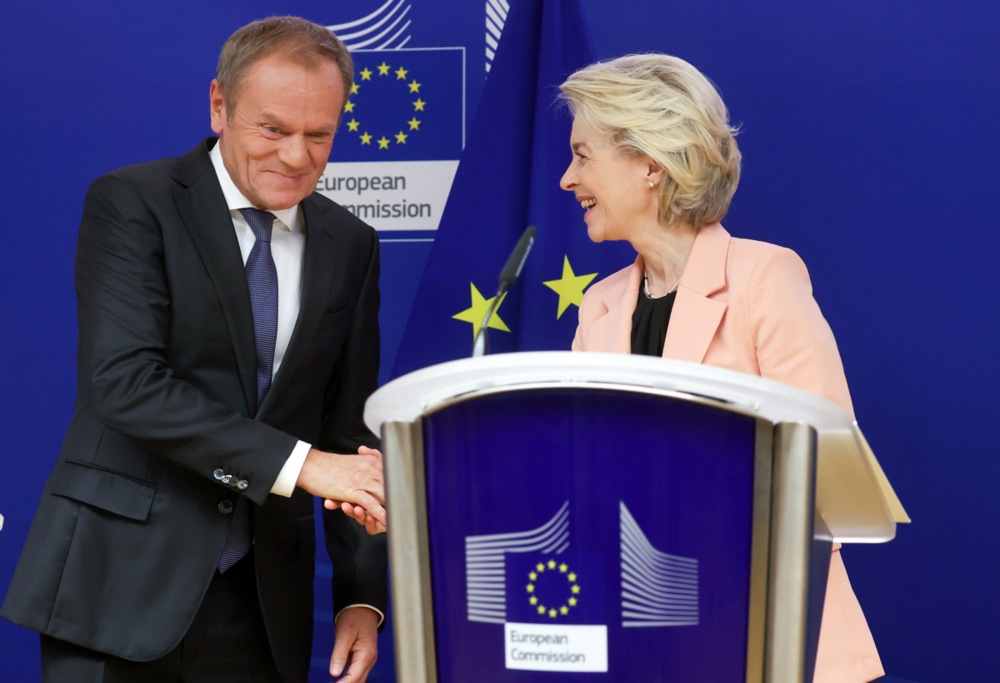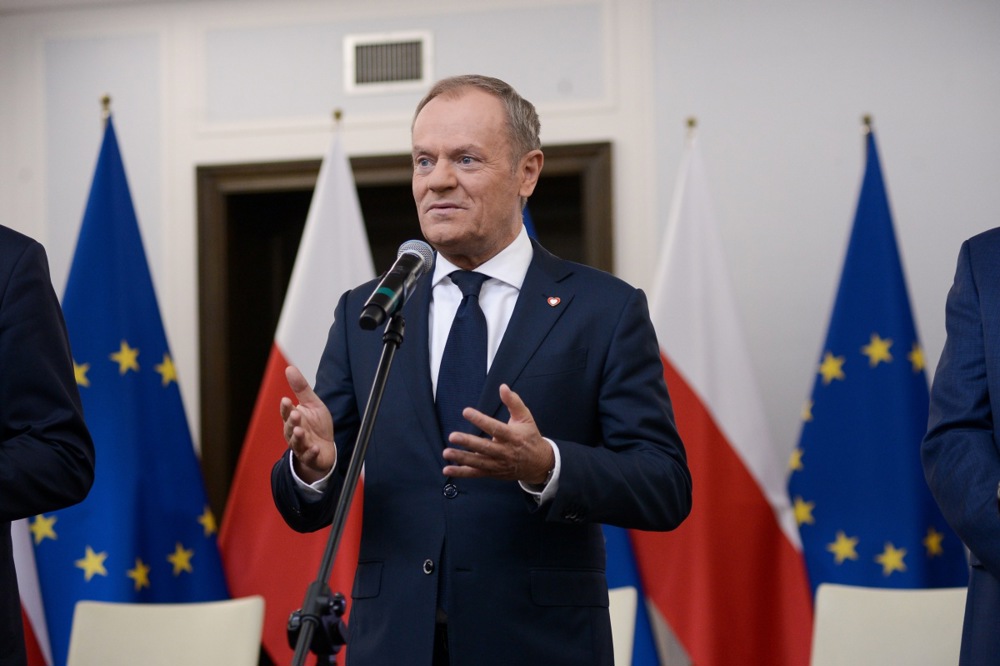Listening to and reading the Western media, one can get the impression that a new European legend has been born: Donald Tusk, almost certain to return as Poland’s Prime Minister in the coming days, is the savior of liberal democracy.
As Politico wrote in its laudation for “Europe’s most influential politician”, he won the duel for the souls of the Polish people:
“For two decades, two men have waged a battle for Poland’s soul. In the blue corner, fighting for a democratic, modern, European vision of the future: Donald Tusk, a former prime minister who served as president of the European Council before returning as leader of the centrist opposition; in the red corner, duking it out for the traditionalists, the Catholic conservatives, the nationalists: Jarosław Kaczyński, leader of the Law and Justice Party (PiS).”
Like a modern-day Saint George who defeated the fire-breathing dragon, Tusk conquered the conservative beast that “terrorised” Poland for the last eight years.
This almost fairy-tale-like figure has kindled hopes in the hearts of Euro-liberal elites that there is some secret weapon that can stop the “black wave” of Right-wing electoral victories across Europe. Since conservative and Catholic Poland could be turned back from the conservative path, maybe the elections to the European Parliament 2024 are not yet lost for liberalism.
Like any legend, this one mostly tells the story that the liberal crowd, depressed by successive defeats in Italy or the Netherlands, wants to hear. But like any legend, it only tells a quarter of the truth, and the ending in the real world can be dramatically different from the tale.
Let’s start with the fact that the best electoral result in the Polish parliamentary elections was recorded by Jaroslaw Kaczynski’s Peace and Justice (PiS). Donald Tusk and his party, proudly bearing the title of slayer of the Right today, actually had a worse result than in the 2011 elections when he last took the reins of government.
This is despite Donald Tusk’s unprecedented support from the European Commission, at every turn chastising and stigmatizing the Right-wing government in Warsaw, despite the financial support of German institutions and loans from German banks.
Despite this, support for Tusk’s party only rose by three percentage points compared to the previous 2019 election.
The price for removing PiS from power was the coming together of all opposition groups into one, the so-called rainbow coalition. Tusk’s government will comprise twelve parties from the post-communists through the progressive Left, and liberals, to the farmers, including an anti-EU faction.
The coalition is so ideologically diverse that its leaders, to build the political identity of the alliance, have been forced to focus not on a positive programme but on one enemy they all hate – on resentment against PiS.
Hence, the rainbow majority plans to appoint people with radically different views from the incumbent government to ministerial positions. The Ministry of Education is to be the domain of anti-religious, leftist activists.
The candidate for the Ministry of Family and Social Affairs wants to redefine the concept of family by opening the door to same-sex unions and various patchworks. The new Children’s Ombudsman is calling for the introduction of LGBTQ Fridays in schools – where children will be able to manifest their sexual preferences.
The Foreign Minister is to be Radoslaw Sikorski, who advocated the appeasement of Russia during the first invasion of Ukraine in 2014, and called on Germany to take a more decisive leadership role in Europe.
Just in case radical changes in social, education, climate, or foreign policy don’t provide enough humiliation of the roughly 40 per cent of the conservative electorate, the Left is planning mass spectacles in the form of special parliamentary committees where members of the former government are to be tried.
Donald Tusk is meticulously planning a series of investigative commissions against outgoing ministers. To mention a few of the mainstream media’s favorites:
- A commission to investigate constitutional violations by the justice minister;
- A commission to investigate irregularities in spending by state institutions;
- A commission to investigate cases of corruption in visa issuance;
- A commission to investigate the abuse of wiretapping;
- A commission to investigate pandemic procurement;
- A commission to investigate election fraud;
- A commission on Ukrainian grain;
- A commission on the merger of oil companies;
- A commission to dismiss the head of the Central Bank.
The question is, will Donald Tusk make it to June’s European parliamentary elections on this fuel?
Will he manage to ignite enough negative feelings toward PiS to distract attention from the election promises he has just reneged on and from many unpopular reforms he is obliged to introduce as part of the milestones set for Poland by Brussels?
Among them are a ban on old cars entering cities, steep increases in energy prices, a VAT hike on food, and the recently publicised issue of expropriating homes to expand infrastructure for wind farms.
All this is to happen while simultaneously a cultural revolution is pushed to satisfy his Leftist coalition partners.
More broadly, to what extent will Tusk’s image as Saint George of the New Europe help Euro-elites struggle with the conservative movement growing continent-wide?
Tusk’s method comes down to intimidation, antagonisation, ridicule, and increasingly sophisticated sanctions to persecute critics of political correctness, climate politics, or migration policies. The technique has been tested many times all over the Western world, and it was this method that led to the loss of public trust in liberal democratic institutions. It brought about the spectacular wins of Giorgia Meloni or Geert Wilders.
We must remember that the phenomenon of Tusk’s victory is not due to his secret weapon but to the weakness and blasphemy of Law and Justice politicians; Polish conservatives were also guilty of arrogance and selfishness as they entered this election without any clear plan and strategy.
All this does not mean that voters will patiently endure Leftist follies in exchange only for opportunities to watch the humiliation of PiS politicians. Tusk’s star and his coalition may be as fragile and short-lived as many other complacent European liberal governments.
They may be convinced that ridiculing critics and calling them fascists is enough to maintain political control. It is not.





Strange bedfellows: Poland’s post-Communists are proving a bulwark against Western progressivism in Tusk’s incoming coalition